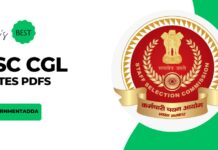General Awareness play a vital role in all Examination. we can expect Questions from different Topics.Here we have given Economics Notes on Definition, scope and nature of Economics for SSC CGL Examinations 2019-20. Candidates those who are all preparing for the Examination can use this study material.
ECONOMICS – DEFINITION AND NATURE & SCOPE OF ECONOMICS
The science of economics was born with the publication of Adam Smith’s An Inquiry into the Nature and Causes of Wealth of Nations in the year 1776.
Adam Smith is known as the father of Economics. At its birth, the name of economics was ‘Political Economy’.
Towards the end of the 19th century there was a definite change from use of word ‘Political Economy’ to ‘Economics’.
The word ‘Economics’ was derived from two Greek words oikou (a house) and nomos (to manage).
DEFINITIONS OF ECONOMICS
Lionel Robbins published a book “An Essay on the Nature and Significance of Economic Science” in 1932. According to him, “economics is a science which studies human behaviour as a relationship between ends and scarce means which have alternative uses”.
The major features of Robbins’ definition are as follows:
a) Ends refer to human wants. Human beings have unlimited number of wants.
b) Resources or means, on the other hand, are limited or scarce in supply. There is scarcity of a commodity, if its demand is greater than its supply. In other words, the scarcity of a commodity is to be considered only in relation to
its demand.
c) The scarce means are capable of having alternative uses. Hence, anyone will choose the resource that will satisfy his particular want. Thus, economics, according to Robbins, is a science of choice.
SCOPE OF ECONOMICS
Scope means province or field of study. In discussing the scope of economics, we have to indicate whether it is a science or an art and a positive science or a normative science. It also covers the subject matter of economics.
i) Economics – A Science and an Art
a) Economics is a science: Science is a systematized body of knowledge that traces the relationship between cause and effect. Another attribute of science is that its phenomena should be amenable to measurement. Applying these characteristics, we find that economics is a branch of knowledge where the various facts relevant to it have been systematically collected, classified and analyzed. Economics investigates the possibility of deducing generalizations as regards the economic motives of human beings. The motives of individuals and business firms can be very easily measured in terms of money. Thus, economics is a science.
b) Economics is also an art. An art is a system of rules for the attainment of a given end. A science teaches us to know; an art teaches us to do. Applying this definition, we find that economics offers us practical guidance in the solution of economic problems. Science and art are complementary to each other and economics is both a science and an art.
ii) Positive and Normative Economics
Robbins brought the controversy weather economics is normative science or positive science. Positive economics concerned to ‘what is’ where as normative economics is ‘what ought to be’. The former is pure science while the latter is an ethical science.
In Robbins view economics is positive science means ‘what is’? or pure science. It is unconcerned with the moral or ethical judgements. It is neutral between ends. Economists are unconcerned with the passing of judgement weather an economic activity increase the welfare or not ?
With regard to normative context, economics is a social science. It is the responsibility of the social scientists to take right decisions. Similarly, it is the responsibility of economists to point out the positive and negative features of economic activities or laws. It is also evident that the importance of moral and ethical laws has continuously
increasing in the business field.
The above discussion states that economics is not only a positive science but also a normative science of what ought to be.
LIMITATIONS OF ECONOMICS
It essential to know the limitations of economics to understand the scope of economics. The limitations of economics are :
1. Even though the life of a human being linked with social, cultural, religions, political and economic activities, economics is limited to only economic activities.
2. Economics will not consider the irrational people such as drunkards, misens etc.
3. It studies the scarce resources in the economy.
4. Economics cannot studies the people who lives in illusions.
5. Economic laws are scientific laws. They explain the cause and effect relationship. Unlike scientific laws, economic laws are not assertive.












